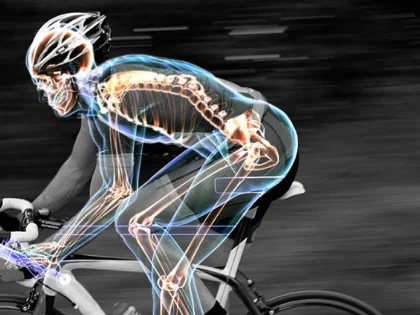Is An Hour of Cycling Enough Each Day?
Cycling is a low-impact workout that has the potential to burn calories well. It is also easy to include into your regular schedule, convenient, and enjoyable. To avoid injury, it's crucial to make sure you're getting enough sleep and mixing up your workouts, whether you're riding alone or in a class.
Increases Metabolism
 Cycling is a fantastic way to increase your rate of metabolism and burn calories, particularly if you ride quickly. Regular cyclists have a lower risk of acquiring diabetes, according to studies. Additionally, by boosting resting metabolic rate and gaining muscle, cycling can aid in weight loss.
An hour of moderate-intensity cycling can burn roughly 500 calories for a 155-pound person. Nevertheless, this figure will change based on your weight and the level of exercise intensity.
The best method to get the most out of your riding regimen is to mix in high-intensity interval training. This entails switching off between intervals of high exertion and slower moving or resting. Riding a bike can increase your metabolism and help you gain muscle, especially in your core and legs. Having more muscles can help you maintain a lower body weight while burning a lot of calories since muscle burns more calories at rest than fat.
Cycling is a fantastic way to increase your rate of metabolism and burn calories, particularly if you ride quickly. Regular cyclists have a lower risk of acquiring diabetes, according to studies. Additionally, by boosting resting metabolic rate and gaining muscle, cycling can aid in weight loss.
An hour of moderate-intensity cycling can burn roughly 500 calories for a 155-pound person. Nevertheless, this figure will change based on your weight and the level of exercise intensity.
The best method to get the most out of your riding regimen is to mix in high-intensity interval training. This entails switching off between intervals of high exertion and slower moving or resting. Riding a bike can increase your metabolism and help you gain muscle, especially in your core and legs. Having more muscles can help you maintain a lower body weight while burning a lot of calories since muscle burns more calories at rest than fat.
Benefits for Muscle Building
 Cycling is a low-impact exercise that tones muscles and burns calories. Gaining muscle mass makes your body appear fitter and leaner since muscles continue to burn calories even when you're not moving. To increase muscle growth and increase calorie burn, you can also experiment with incorporating additional strength-training workouts.
Since cycling is frequently easy to incorporate into everyday routines, many find it to be a practical way to get their fitness done. They can ride their bikes in the morning or during lunch. Some even switch from vehicles to bikes to reduce time spent driving and fuel expenses.
Cycling is an excellent full-body workout because it strengthens the muscles in the lower legs, back, and abs. Cycling also aids in preventing the production of lactic acid, which can cause cramping and stiffness in the muscles. Numerous cycling programs provide an enjoyable ambiance that can elevate your mood, complete with loud music and dimly lit rooms.
Cycling is a low-impact exercise that tones muscles and burns calories. Gaining muscle mass makes your body appear fitter and leaner since muscles continue to burn calories even when you're not moving. To increase muscle growth and increase calorie burn, you can also experiment with incorporating additional strength-training workouts.
Since cycling is frequently easy to incorporate into everyday routines, many find it to be a practical way to get their fitness done. They can ride their bikes in the morning or during lunch. Some even switch from vehicles to bikes to reduce time spent driving and fuel expenses.
Cycling is an excellent full-body workout because it strengthens the muscles in the lower legs, back, and abs. Cycling also aids in preventing the production of lactic acid, which can cause cramping and stiffness in the muscles. Numerous cycling programs provide an enjoyable ambiance that can elevate your mood, complete with loud music and dimly lit rooms.
Lifts Your Spirits
 Your brain releases endorphins, which are feel-good chemicals that improve mood and aid in concentration, when you ride a bike. Because of this, cycling is a great way to reduce stress and is particularly beneficial for people who are depressed or have low moods.
In addition to reducing the amount of time food takes to pass through the large intestine, aerobic activity also helps avoid constipation and bloating. It can also prevent bowel cancer and aid in the stimulation of intestinal muscle contraction.
The greatest method to optimize the advantages of cycling is to make it a regular part of your schedule. Warloski suggests trying to ride a couple of times a week or every other day. This allows your body to accumulate glycogen stores prior to the occurrence of "bonking," a state in which your body runs out of stored energy. After that, you'll be able to ride harder the next time.
Your brain releases endorphins, which are feel-good chemicals that improve mood and aid in concentration, when you ride a bike. Because of this, cycling is a great way to reduce stress and is particularly beneficial for people who are depressed or have low moods.
In addition to reducing the amount of time food takes to pass through the large intestine, aerobic activity also helps avoid constipation and bloating. It can also prevent bowel cancer and aid in the stimulation of intestinal muscle contraction.
The greatest method to optimize the advantages of cycling is to make it a regular part of your schedule. Warloski suggests trying to ride a couple of times a week or every other day. This allows your body to accumulate glycogen stores prior to the occurrence of "bonking," a state in which your body runs out of stored energy. After that, you'll be able to ride harder the next time.
Enhances Your Sleep Quality
 Riding a bike, even recreationally, causes physiological changes that transform you into an energy- and fat-burning machine that lasts for hours after you park your bike. People who cycle regularly have higher levels of fitness condition and muscular mass, as well as better overall health, because your body needs calories to repair and replenish muscles.
Furthermore, riding has a positive impact on mood. Frequent aerobic exercise, such as cycling, increases the synthesis of nitric oxide and a protein called noggin, which both support the creation of new neurons in the brain. This is like a wonder drug for your brain. Better memory, increased focus, more flexible thinking and reasoning, and improved problem-solving abilities are the end results. According to a study, those who cycle frequently actually live five years longer on average than people who don't exercise.
Riding a bike, even recreationally, causes physiological changes that transform you into an energy- and fat-burning machine that lasts for hours after you park your bike. People who cycle regularly have higher levels of fitness condition and muscular mass, as well as better overall health, because your body needs calories to repair and replenish muscles.
Furthermore, riding has a positive impact on mood. Frequent aerobic exercise, such as cycling, increases the synthesis of nitric oxide and a protein called noggin, which both support the creation of new neurons in the brain. This is like a wonder drug for your brain. Better memory, increased focus, more flexible thinking and reasoning, and improved problem-solving abilities are the end results. According to a study, those who cycle frequently actually live five years longer on average than people who don't exercise.









